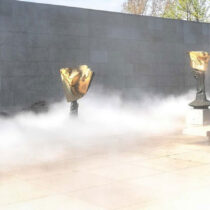One of the world’s most important historic book collections, from the Austrian National Library (Österreichische Nationalbibliothek, www.onb.ac.at), will be made freely available to the public via Europeana.eu. thanks to the library’s digitisation programme and Europeana’s introduction of a new rights statement.
The collection includes landmarks in the history of modern thought such as texts by Martin Luther as well as insights into more everyday life, from historic cookbooks to children’s spelling books. Another highlight is the library of Prince Eugene of Savoy, one of the most successful military commanders in Europe’s modern history and one of the most ambitious book collectors of his time.
The Austrian National Library is the first library in Europe to share a collection that has been digitised as part of the Google Books project under the new rights statement.
It is the first step toward creating a truly pan-European collection of books digitised in partnership with leading libraries and Google, available to the public via Europeana.eu.
Through Austrian Books Online, the Austrian National Library’s public-private partnership with Google, the library is currently digitising and making available its complete holdings of historical books from the 16th to the second half of the 19th century. About 600,000 volumes will be available to the public via Europeana in high quality format. The first 150,000 are now online.
Thanks to the introduction of the new rights label ‘Out of copyright – non-commercial re-use’ (OOC-NC), the Austrian National Library and Google can now share this unique collection also via Europeana. The rights statement means that books that are out of copyright and digitised through public-private partnerships are clearly marked as being freely available to the public for non-commercial re-use for a limited time and available for unrestricted re-use after that period.
The label supports Europeana’s Public Domain Charter and underlines the importance of openness and re-use, while recognising the role of public-private partnerships in supporting digitisation. As a result of the new statement, in the future millions of books that otherwise would not have been available via Europeana can be read by readers worldwide: Other libraries across Europe that have digitised collections through Google Books or other private public partnerships will also be able to make collections available via Europeana using the OOC-NC rights label.
The new rights statement was developed through the Europeana Network, with input from Google, the Austrian National Library and other European libraries involved in the Google books project.
Jill Cousins, Executive Director of Europeana said: ´We are so pleased to be able to announce this result. It provides a fair balance between the need to pay for the digitisation of our cultural heritage, supported so strongly by Google, and the desire to make sure that the public can use the material widely in connection with other parts of our diverse and rich European history.´
Johanna Rachinger, Director General of the Austrian National Library, said: “With our major digitisation project Austrian Books Online we would like to contribute to the democratisation of knowledge. I am delighted that these books can now be found also in Europeana.”
Ben Bunnell, Google Library Partnerships said: “We set up the Google Books Library project to help make the printed record of human history more available to the world. Including links on Europeana helps more people find and use these materials, complementing the access provided on libraries’ websites and on books.google.com.”
News: Digital libriaries
Making Europe’s cultural heritage more open
Europeana, the Austrian National Library and Google join forces
08 Oct 2014
by Archaeology Newsroom
- A
- A
- A
Listen up
1.
Europeana




